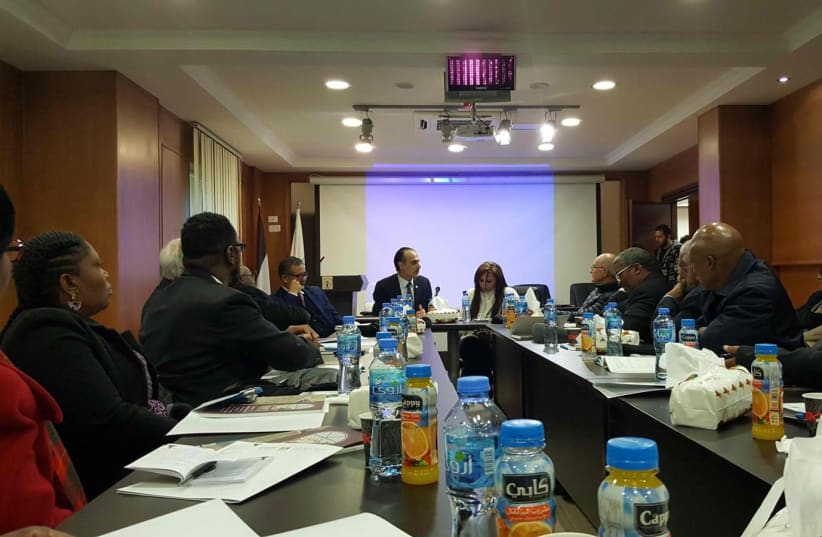A group of well-known Christian leaders from America and South Africa, who represent over 55 million worshipers collectively, slammed Israel for its treatment of Palestinians and called for economic pressure to be applied, following a 10-day trip to the country.
The leaders visited Israel and the Palestinian territories “on a religious pilgrimage as a joint delegation of leaders from historic black denominations of the National Council of Churches (NCC) in the United States of America, and heads of South African church denominations of the South African Council of Churches (SACC)” between February 21 and March 1.
While on the trip, the group said they “came to visit Israel and the Palestinian Territories in the hope of meeting Israeli and Palestinian citizens.” The group said that Israel’s “draconian security measures” were stoked by a “thick density of fear” that begets hatred.
They also implied that there were similarities between the Holocaust, apartheid and the suffering of the Palestinians.
“We admit that silence in the face of injustice is complicity,” the leaders highlighted. “Indeed, there were many Christians that were silent and closed their ears against the sound of the deadly apartheid jackboot in the lives of South African blacks.
“[Christian] communities and neighborhoods in Europe were silent and complicit to the horror of the Holocaust. We shall not and cannot be silent,” they added.
The Christian leaders said they came seeking a better understanding of the realities on the ground, “particularly related to the Occupied Palestinian Territories [east Jerusalem, West Bank and the Gaza Strip],” adding that they came as people “with a shared history of racial segregation; victims of injustice, people who have been dehumanized and marginalized... and as people who stand against racism, against antisemitism, against Islamophobia.”
The group claimed that they were “shocked at what appears to be an unstoppable gobbling up of Palestinian lands to almost render the proposed two-state solution unworkable,” as well as being “cut up by the misery in which poor families in Palestine have to survive – especially those holed up in refugee camps, with only the original key and their ownership papers to clutch onto. We call for the return of refugees and exiles.”
They added that they were worried about “the increasing hardening of the hearts of the Israeli powers-that-be” when it comes “to the prospect of a just peace with security and dignity for all.”
The South African and American Christian leaders explained that they witnessed patterns, which seemed to have been “borrowed and perfected” from other previous oppressive regimes. They compared the security barrier to the Berlin Wall, and discussed the roads built through occupied Palestinian villages on which Palestinians are not permitted to drive. They said the “heavy militarization of the West Bank, [was] reminiscent of the military occupation of Namibia by apartheid South Africa” and decried the “laws of segregation that allow one thing for the Jewish people and another for the Palestinians.”
The delegation also insisted that they had witnessed “evidence of forced removals” in which they saw “homes abandoned, olive trees uprooted or confiscated and taken over, and shops and businesses bolted with doors welded to close out any commercial activities.”
Despite their heavy criticism of Israel, the Christian leaders were also critical of the Palestinian leadership, saying that they are “disheartened by the patent divisions among the Palestinian political leaders that make it almost impossible for them to come to a common position and vision of the way to justice, peace and security for all... We hope for elections soon in the Palestinian territories and that these will be peaceful and without disputes, in order to enhance the unity of the Palestinian people and their positions on a peaceful and prosperous future for all.
“We support a two-state solution in which a safe and secure State of Israel will reside next to a safe, secure, viable and contiguous state of Palestine,” they said. “Based on our own histories and struggles as South Africans and African Americans, we are keenly aware of the need to preserve the option of utilizing economic pressure as a means of bringing recalcitrant dominant forces to the negotiating table.”
Among the Christian leaders from South Africa were Bishop Zipho Siwa, Malusi Mpumlwana, Bishop Mosa Sono, Bishop George Crenshaw and Pastor M.G. Mahlobo.
Coming from the United States were Jim Winkler, Reverend Tyrone Pitts, Bishop Darin Moore and Senior Pastor Dr. Cassandra Gould, among others.
